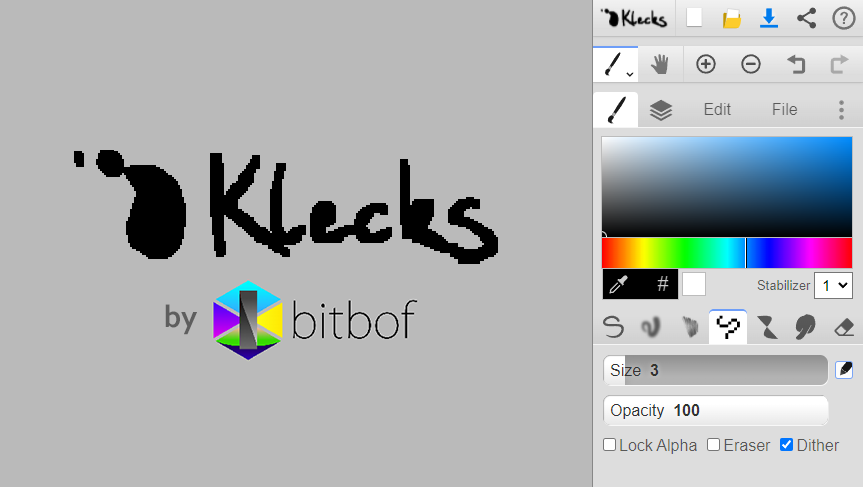🖌️ Demo | ❓ About | 📝 Dev Blog
Klecks (German for "splash of color", pronounced "clex") is the official open-source release of the community-funded online painting app Kleki.
Klecks can run in standalone mode (e.g. on kleki.com), or embed (e.g. on 2draw.net) for drawing communities.
- Layers
- Pen-support with pressure and stabilizer
- Touch gestures
- Brushes: pen, blend, sketchy, pixel, chemy, smudge, eraser
- Tools: selection, paint bucket, text, shapes, gradient
- WebGL-powered filters: blur, tilt-shift, curves, distort, noise.
- Lineart extraction
- Editing tools: transform, crop/expand, resize, perspective
- Supports all major form factors: desktop, tablet and phone
- Multi-language (10+ languages)
Created by developer/artist bitbof
- initialize via
npm install(requires node and npm to be installed already) npm run lang:build- generate language files necessary to run Klecksnpm run start- dev server (to run it locally)npm run build- build standalone into/dist/npm run build:embed- build of embed into/dist/npm run build:help- build help page (when clicking the questionmark) into/dist/
Example usage of the embed can be found under: /examples/embed/
To run Klecks (standalone) within a Docker container, run the following commands in project root:
docker-compose build
docker-compose up -d
It is then accessible through: http://localhost:5050
Are you a native speaker or have advanced skills in a language with no translation yet? Any contribution by you is highly encouraged and appreciated!
Translations are located in src/languages where each translation is its own JSON5 file, e.g. de.json5 for German.
Within such a file everything except value is to be kept in sync with _base-en.json5.
{
// key by which this text is referenced in code
stabilizer: {
// A hint, further explaining the text
hint: 'Common feature in drawing software to make lines smoother',
// Original text (English)
original: 'Stabilizer',
// Translated text
value: '抖动修正'
},
// ...
}To create a new translation run npm run lang:add <code>, which creates src/languages/<code>.json5. You find all
(ISO 639-1) language codes in src/languages/languages.json. The generated file will already include everything except value.
To edit an existing translation, simply edit one of the files in src/languages. If a language file is out of sync with
src/languages/_base-en.json5 (English), whatever key is out of sync will be ignored and fall back on English. English is the
source of truth. A translation cannot add new keys without them also being present in _base-en.json5.
To see your changes in Klecks, run npm run lang:build. It needs to be run whenever changes to src/languages are
made or it won't be up-to-date. Then build or start Klecks.
A translation should try not to cause additional line-breaks in the UI if possible. Test to make sure translations fit the context of the application. Note, some texts are only visible in the standalone-version and vice versa with the embed-version.
npm run lang:add <code>- creates new language filesrc/languages/<code>.json5.- See (ISO 639-1) language codes in
src/languages/languages.json
- See (ISO 639-1) language codes in
npm run lang:sync <code>- synchronizes with base file. (TODO)npm run lang:build- generates JSON & TS files insrc/app/languages- Problems are printed to the command line output
Klecks and Kleki are community funded. Donate today
bitbof © 2024 - Released under the MIT License. Icons by bitbof are public domain (excluding the Klecks logo, bitbof logo).
If you wish to say you're using "Kleki" and use its branding you must acquire a license from bitbof. You are free to say you're using "Klecks".
